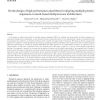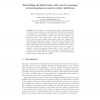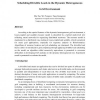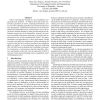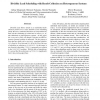109
click to vote
RTAS
2010
IEEE
14 years 12 months ago
2010
IEEE
Providing QoS and performance guarantees to arbitrarily divisible loads has become a significant problem for many cluster-based research computing facilities. While progress is be...
126
click to vote
JPDC
2007
15 years 1 months ago
2007
In this paper, we address the problem of multiple sequence alignment (MSA) for handling very large number of proteins sequences on mesh-based multiprocessor architectures. As the ...
134
click to vote
HIPC
2005
Springer
15 years 7 months ago
2005
Springer
Abstract In this paper, we consider the problem of scheduling divisible loads onto an heterogeneous star platform, with both heterogeneous computing and communication resources. We...
138
click to vote
INFOSCALE
2006
ACM
15 years 8 months ago
2006
ACM
According to the special features of the dynamic heterogeneous grid environment, a loose-coupled and scalable resource model is described by a hybrid multi-level tree reflecting a...
108
click to vote
IPPS
2006
IEEE
15 years 8 months ago
2006
IEEE
This paper deals with scheduling divisible load applications on star networks, in presence of return messages. This work is a follow-on of [6, 7], where the same problem was consi...
149
click to vote
RTAS
2007
IEEE
15 years 8 months ago
2007
IEEE
Cluster computing has emerged as a new paradigm for solving large-scale problems. To enhance QoS and provide performance guarantees in cluster computing environments, various real...
131
click to vote
ISPDC
2007
IEEE
15 years 8 months ago
2007
IEEE
Scheduling divisible loads in distributed systems is the subject of Divisible Load Theory (DLT). In this paper we show that coalitional game theory is a natural fit for modeling ...
109
click to vote
IPPS
2008
IEEE
15 years 8 months ago
2008
IEEE
Divisible Load Theory (DLT) is an established mathematical framework to study Divisible Load Scheduling (DLS). However, traditional DLT does not comprehensively deal with the sche...

